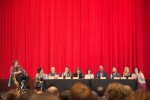Even in a city as industry intensive as Los Angeles, there can be a certain mystique to the working processes of Hollywood film and TV. “The Write Stuff: Your Future in Television,” a panel of UCLA School of Theater, Film and Television alumni who’ve worked in television, aimed to dispel that mystique by providing answers to one of the most elusive and attractive questions: How does one break into the business?
Melnitz Hall’s James Bridges Theater was a packed house Wednesday night, filled with mostly film and television students and film enthusiasts looking to get some insider information. Many notebooks were laid out; pens were scratching. There was a lecture hall feel, only school had yet to start. But far from dishing out tricky tips and sly maneuvers, the prevailing theme of the panel was one of “due diligence,” as multiple panelists called it.
Andrew Goldberg, a writer for “Family Guy” who worked as creator Seth MacFarlane’s assistant before becoming a writer, particularly stressed the model of hard work and good attitude, summing it up in a brisk motto: “Be nice, and be cool.” Asked to elaborate by moderator Fred Rubin, a TFT lecturer, as well as writer and producer of “Night Court,” Goldberg added to not be overbearing.
“It’s hard for some people to not be creepy,” Goldberg said. “You’ll have a bit, but no one wants to see that bit while they’re in the kitchen, you know? Be cool, be nice.”
Kelly Fullerton, a former writer for “Awkward.,” further recommended a disposition of cheerfulness and eagerness.
“Don’t be the one that gets punched at midnight,” Fullerton said. “After a long, stressful day, be the person that people still want to hang out with, who doesn’t make them want to punch you.”
The panel soon shifted emphasis on having material to back up one’s diligence, as well as showcasing talent as quickly and provocatively as possible. Lauren Caltagirone, a former writer for “Family Guy,” said she got her break by running a Twitter account.
“I got noticed because of my tweets,” she said. “But that wouldn’t have mattered if I didn’t have scripts to back me up, to show that I was a writer.”
As the topic became more and more business-oriented, including an all-panel survey of whether each writer had a lawyer, an agent or a manager – or two, or all three – the writers stressed the importance of doing the job.
“Remember that the agent works for you,” said Susan Hurwitz Arneson, who wrote for “South Park” for six years. “Remember that you have something that no one else does – scripts. Without us no one in this industry would have jobs.”
Berkley Johnson, a longtime writer for Conan O’Brien and a current writer for “New Girl,” said he agrees.
“I wish that I had known that back then,” Johnson said. “I would have spent a lot more time writing and less time worrying about agents and stuff like that.”
The most illuminating aspects of the panel were the various descriptions of how a job writing for television actually works. Caltagirone said that jokes are constantly being thrown into the air and rejected, and the process goes on and on until the final product is realized.
“The worst part is knowing that it goes on forever,” Goldberg said. “But television is such a collaborative medium, and you get to hear so many talented writers’ ideas, so it’s really not that bad.”
The panelists were further questioned about how much of their writing is retained in the final draft, and many expressed a certain randomness to the procedure.
“Sometimes I had the ability to shepherd an entire script,” said Bryan Holdman, a writer for “The Vampire Diaries.” “Sometimes it would go through production and it would be a completely different episode!”
Because of such circumstances, the writers emphasized the quality of the writing, especially in having a distinct own voice.
“So much of TV writing is formulaic,” Johnson said. “So if you’ve got something unique it instantly lights up the script.”
The panel closed out with questions from the audience, and about a dozen curious students went up to pose questions about their own concerns with breaking into the industry. The night ended on a question about each panelist’s inspiration for becoming a writer, eliciting touching responses from each writer about his or her relationship to the craft. A widespread sentiment was a love of the finished product: of producing work that creates joy.
“What I loved about television was that no matter how bad your day was, you were still looking forward to the show,” Arneson said. “I wanted to do that. I wanted to make that.”
